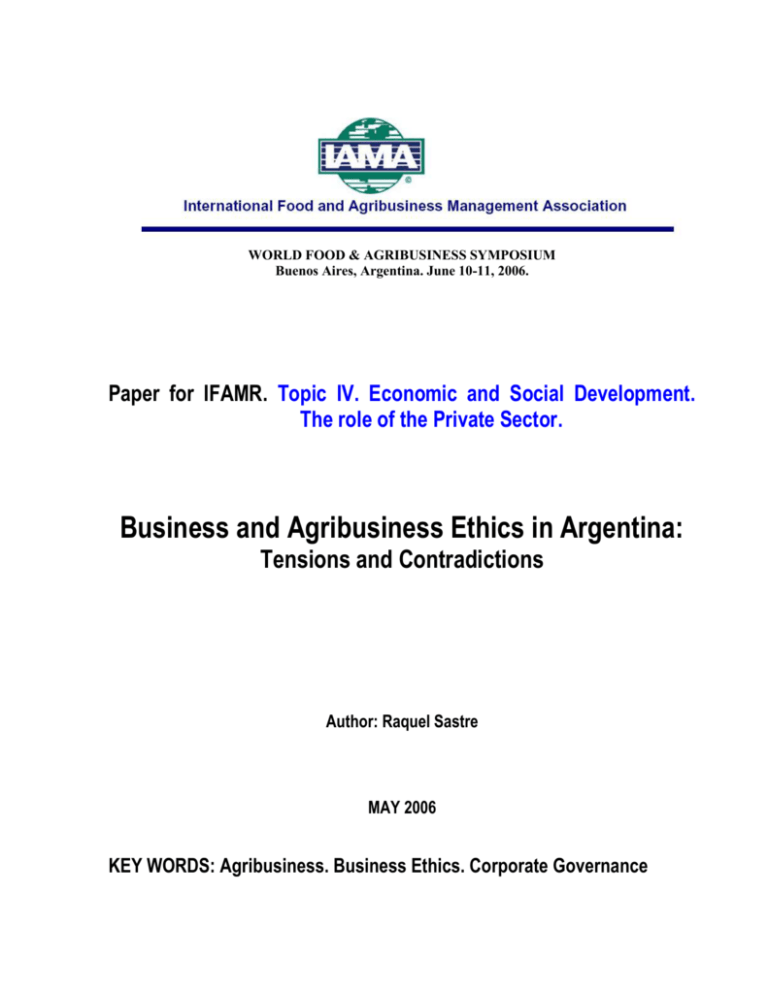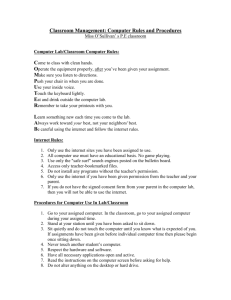world food & agribusiness symposium
advertisement

WORLD FOOD & AGRIBUSINESS SYMPOSIUM Buenos Aires, Argentina. June 10-11, 2006. Paper for IFAMR. Topic IV. Economic and Social Development. The role of the Private Sector. Business and Agribusiness Ethics in Argentina: Tensions and Contradictions Author: Raquel Sastre MAY 2006 KEY WORDS: Agribusiness. Business Ethics. Corporate Governance TABLE OF CONTENTS Introduction: Ethics and Agribusiness...........................................................................................03 Methodology for Studying the Agribusiness Sector.......................................................................04 Interview Results.......................... .................................................................................................06 Conclusions....……….....................................................................................................................14 Bibliography........................................................................................................ ...........................16 Business and Agribusiness Ethics in Argentina. R. SASTRE. IAMA 16th Annual World Symposium. 2 Introduction Concern for ethical issues draws back to the origins of Western civilization in Greece. The word “ethics” derives from the Greek term ethos meaning the “character” or “manner of being” that directs the conduct of individuals. From those distant times and until the last century, philosophy seemed to be the discipline in charge of delving into the concept and its meaning, as if there were a divorce between ethics and business. Globalization, transnationalization of business activities and cultural diversity faced by organizations in the XXI century emphasized the need to reflect upon the issues of ethics in business. Several studies and research works were published in the past years, originated mainly in Northern Hemisphere countries; moreover, ethics has been included as a regular course in the curricular programs of many business schools in those countries. This scenario raises the question: ¿Which is the concern for ethical aspects in agribusiness reality in Argentina? ¿Is it possible to conceive business ethics without civic ethics? This work presents the results of interviews to agribusiness entrepreneurs, investigating the degree of acknowledgment of the ethical nature of a given situation, the provision reflected in formalized codes (such as codes of ethics) for managing the situation, and the actual execution of the measure or attitude foreseen as an answer to an act that does not match an expected conduct. The answers show that, in spite of the fact that participants in the sector perceive themselves as having high ethical values as well as concern for the communitites where they operate and for the environment, when actually confronted with a society showing weak institutions and minimum values, there is a tendency to downgrade those values and to deal with the lowest ethical standards. Business and Agribusiness Ethics in Argentina. R. SASTRE. IAMA 16th Annual World Symposium. 3 Methodology for studying the agribusiness sector With the aim of defining the scope of our research, the agricultural chain that includes the participants described in Figure I was selected among agribusiness activities. Figure I Input Provider Internal Client (Industry Agent/Consumer) Stockpiler Primary Producer External Client (Exporter) Other referent organizations in the sector Logistics Commercialization Agents In the cases of Stockpiler, Internal Client, External Client and Commercialization Agent, participants that ranked among the top five companies of the sector were selected. In all cases, interviewed subjects belonged to the top executive level in the organization. With one exception, all participants were either founders of the company or had joined it because of family relationships with them. Fifty seven per cent of selected companies operated in more than one link of the agribusiness chain, and considering the purpose of the interview, respondents were requested to answer from the standpoint of only one segment. Participants were asked both about their own ethical values and their perception of values in the other members of the system. The interview questionnaire consisted of two parts. The first part posed eight situations, four involving behaviors between members within the company, and four involving relationships among organizations in the sector. Business and Agribusiness Ethics in Argentina. R. SASTRE. IAMA 16th Annual World Symposium. 4 Following the description, subjects were requested to qualify the conduct as “ethical” or “unethical”. In case of doubt, they could select a third option stating: “It depends”. Then, regarding all situations in which conduct was qualified as “unethical” or “it depends” subjects were asked to tell if their organizations contemplated measures that could be applied when detecting this behavior, and if such provision existed, whether those measures were actually written. When subjects declared that those measures did exist, whether written or not, they were asked to estimate in all cases the frequency of application, selecting: 1) never, 2) seldom, 3) frequently and 4) always. The first part of the questionnaire aimed at assessing the extent of ethical and unethical behavior identification, as well as the provision of punishing measures and their effective application. The second part presented usual situations in entrepreneurial activities, some of them with an evident ethical side, such as compliance with nonwritten agreements and product specifications, and others related with legal issues, such as formality regarding labor contracts. Subjects were asked to express their perception about the average occurrence of described situations in organizations that conform all the other links of the agribusiness chain, with the aim of identifying the degree of commitment with moral principles as it is perceived in the segment. . Business and Agribusiness Ethics in Argentina. R. SASTRE. IAMA 16th Annual World Symposium. 5 Interview results In the framework of deontological ethics, based on principles underlying acts, their universality and justification, and not on their consequences (Bowie, 2001:5), a question referring to an evident unethical act with “good” ends prompted by necessity was included. In 100 % of the cases, the behavior was identified as “unethical” in agreement with Kant’s teachings on ethics: If theft, murder and lie could be justified by necessity, then necessity would substitute all morality, and each individual would rely on his personal judgment to define what should be considered a case of necessity, and in the absence of a precise criterion for this purpose, moral rules would become uncertain. (Kant, 2003:175) In situations describing staff members using company equipment or tools for their own benefit, or absenteeism due to the need of investing time on private business, 50% of the respondents chose to answer “it depends” when asked to qualify behavior. Ethical relativity was basically grounded on previous agreements between the company and its employees, and effective authorizations to deal with company resources. The majority of respondents declared to behave understandingly regarding necessities of the staff, and at the same time admitted to devote a considerable time to communicate current rules, and that they expected their employees to respect them, and in case of exception to request authorization to carry it out. This expectation positions ethics as an intentional philosophy that links actions with a motive and its acknowledgment. To express intentions is the main basis of any type of human association, and for this reason it is so important to communicate one’s thoughts, because without this presupposition, social intercourse becomes absolutely worthless. We can only judge what others think by their declarations, which should be a truthful expression of their thoughts, because without this presupposition no human society can ever be established. (Kant, 2003:269) In two situations involving relationships between organizations in the sector, all answers were identical and identified behaviors as “unethical”: 1) to close a deal verbally and not to fulfill it (a respondent qualified it as “awful”, another said it was “terrible” and in another case it was stated that “to honor one’s word” should be the most respected value in the organization’s culture) and 2) to deliver products or services that do not meet specifications “to see whether it passes unnoticed”, a seemingly usual practice in the sector, severely criticized. This vision of individuals with opportunistic behavior The translation of this and subsequent quotes is provided for the sole purpose of communicating this research work (Translator’s note). Business and Agribusiness Ethics in Argentina. R. SASTRE. IAMA 16th Annual World Symposium. 6 coincides with the perspective of theorists of the line of thought known as the New Institutional Economics (Williamson, 1991), which focuses on the transaction costs that result from this behavior. When respondents were asked to indicate if there were any rules to penalize behaviors considered unethical, 13.6% said that those rules were written, 16.0% said there was no penalization and 70.4% declared that the rules existed but were not written. Most of the subjects affirmed that all members of the organization knew in depth the ethical rules and values of the management board, which were verbally transmitted. Bird & Waters developed a matrix allowing to cross actions performed by executive managers with moral terms expressed in their speech, generating four types of moral conduct: 1) Congruent Moral Conduct, when discourse terms coincide with actions according to normative expectations; 2) Moral Muteness, when actions respond to normative expectations but moral terms are not used in discourse; 3) Hypocrisy and/or Moral Weakness when moral terms are used in discourse but actions do not fulfill normative expectations and 4) Immoral and/or Immoral Congruent Conduct, when actions do not fulfill normative expectations and moral terms are not used in discourse, (Bird & Waters, 1979). According to answers, the sector could be placed in situations 1 or 3 in the matrix, considering respondents emphasized the fact that values are verbally transmitted, intending to provide guidelines to be shared in action. Although in 84% of the cases there were prescribed penalties for conducts identified as unethical, only 18.5% of respondents reported that penalties were always or frequently applied. The remaining 81.5% answered that the proposed situations never or seldom occurred and were penalized. The second part of the questionnaire is condensed in Figure II showing how representatives of each link in the agribusiness chain perceive the behavior of the other participants faced with five situations involving ethical and legal conducts: 1) to comply with nonwritten agreements, 2) to comply with payment obligations, 3) to comply with products and services specifications, 4) to comply with labor laws 5) to comply with business formal practices. Business and Agribusiness Ethics in Argentina. R. SASTRE. IAMA 16th Annual World Symposium. 7 Figure II To comply with nonwritten agreements To comply with payment obligations Never Seldom Frecuently Always I do not know Never Seldom Frecuantly Always I do not know To comply with products and services specifications To comply with labor laws Never Seldom Frecuently Always I do not know Never Seldom Frecuently Always I do not know To comply with business formal practices Never Seldom Frecuently Always I do not know Business and Agribusiness Ethics in Argentina. R. SASTRE. IAMA 16th Annual World Symposium. 8 As can be observed in the above graphics, the condition “to comply with business formal practices” recorded the highest percentage of “never” and “seldom” answers, indicating a poor compliance with the activity regulations. John Rawls ranks the principle of justice as the highest value in a society. He sustains that efficient but unfair laws or institutions should be abolished; what matters is the principle and not the end. Individuals possess an inviolability founded on justice that even the welfare of society as a whole cannot override. He emphasizes in this way the prevalence of the concept defining it as the primary virtue in human activity, and he opposes totalitarianism considering that results per se are not indicative of fair measures (Rawls, 2002). In this light, one might well ask to what extent are the laws regulating the activity fair, that is, if they aim at collective welfare without overriding the rights of participants in the agribusiness chain and thus promoting noncompliance. Figure III shows how members of the agribusiness chain are perceived by the rest of participants. Figure III Input Provider 100 80 Nunca 60 Raras veces Frecuentemente 40 Siempre 20 No sabe 0 Sit.1 Sit.2 Sit.3 Sit.4 Sit.5 Sit.1. To comply with nonwritten agreements Sit.2. To comply with payment obligations Sit.3. To comply with products and services specifications Sit.4. To comply with labor laws Sit.5. To comply with business formal practices Business and Agribusiness Ethics in Argentina. R. SASTRE. IAMA 16th Annual World Symposium. 9 Primary Producer 100 80 Nunca 60 Raras veces Frecuentemente 40 Siempre 20 No sabe 0 Sit.1 Sit.2 Sit.3 Sit.4 Sit.5 Sit.1. To comply with nonwritten agreements Sit.2. To comply with payment obligations Sit.3. To comply with products and services specifications Sit.4. To comply with labor laws Sit.5. To comply with business formal practices Stockpiler 100 80 Nunca 60 Raras veces Frecuentem ente 40 Siem pre 20 No sabe 0 Sit.1 Sit.2 Sit.3 Sit.4 Sit.5 Sit.1. To comply with nonwritten agreements Sit.2. To comply with payment obligations Sit.3. To comply with products and services specifications Sit.4. To comply with labor laws Sit.5. To comply with business formal practices Business and Agribusiness Ethics in Argentina. R. SASTRE. IAMA 16th Annual World Symposium. 10 Industry Agent / Consumer 90 80 70 60 50 40 30 20 10 0 Nunca Raras veces Frecuentemente Siempre No sabe Sit.1 Sit.2 Sit.3 Sit.4 Sit.5 Sit.1. To comply with nonwritten agreements Sit.2. To comply with payment obligations Sit.3. To comply with products and services specifications Sit.4. To comply with labor laws Sit.5. To comply with business formal practices Exporter 100 80 Nunca 60 Raras veces Frecuentemente 40 Siempre 20 No sabe 0 Sit.1 Sit.2 Sit.3 Sit.4 Sit.5 Sit.1. To comply with nonwritten agreements Sit.2. To comply with payment obligations Sit.3. To comply with products and services specifications Sit.4. To comply with labor laws Sit.5. To comply with business formal practices Business and Agribusiness Ethics in Argentina. R. SASTRE. IAMA 16th Annual World Symposium. 11 Transportation Company 90 80 70 60 50 40 30 20 10 0 Nunca Raras veces Frecuentemente Siempre No sabe Sit.1 Sit.2 Sit.3 Sit.4 Sit.5 Sit.1. To comply with nonwritten agreements Sit.2. To comply with payment obligations Sit.3. To comply with products and services specifications Sit.4. To comply with labor laws Sit.5. To comply with business formal practices Commercialization agent 70 60 50 Nunca 40 Seldom 30 Frequently 20 Siempre No sabe 10 0 Sit.1 Sit.2 Sit.3 Sit.4 Sit.5 Sit.1. To comply with nonwritten agreements Sit.2. To comply with payment obligations Sit.3. To comply with products and services specifications Sit.4. To comply with labor laws Sit.5. To comply with business formal practices Business and Agribusiness Ethics in Argentina. R. SASTRE. IAMA 16th Annual World Symposium. 12 Exporters, commercialization agents and input providers are those participants most frequently perceived as showing “always” or “frequently” ethical conducts, due mainly to two factors. In the first place, because of their leadership style, since these participants are usually global enterprises that hire professional executives for management tasks. Adela Cortina remarks when considering entrepreneurial leadership as moral leadership: We are also inquiring about ways of acting that include that “character”, and that materialize in a number of attitudes that guide and conform professional activities. These attitudes generate ways of working, a management style and a culture where certain socially valuable components are fostered. (Cortina, 2000: 95) The majority of respondents coincided in pointing that transmitting ethical values through the example of the leader’s actions is the most effective way to conform a solid organizational culture, by means of a moral administration. Immoral administration is a style that not only lacks ethical principles or precepts, but also implies a definite and active opposition to what is ethical. ...This point of view sustains that management motives are selfish, and purely based on personal or organizational benefits... Deliberate immoral managers simply believe that ethical considerations pertain to our private life and not to business... For a moral administration, managers need to understand and to be sensitive to all persons directly related with the organization and the interests of each of these groups. (Frederick, 1999: 172-179) Another factor highly valued by respondents for its contribution to current legislation compliance was control exerted over companies by government institutions. According to Kantian ethics principles, these behaviors would fit not in an ethical but in a juridical system. All actions are certainly necessary according to discernment, provided there is a motivation to perform them. When that motivation results from coaction, the action need is juridical; but if it results from the intrinsic goodness of the action, then the need is ethic. (Kant, 2003: 113) Business and Agribusiness Ethics in Argentina. R. SASTRE. IAMA 16th Annual World Symposium. 13 Conclusions In the 1990s, the ethical issues arising from corporate control and that involve political and social justice aspects started to appear in business literature. The debate was held about the scope of the meaning of organizations’ social responsibility and the relevance and influence of their values in the context where they act. In the Argentine history, the agribusiness sector, since its origins and until our days, had vital importance in the economy of the country; the land and the emblematic figure of the gaucho are part of the national identity. The term gauchada is associated with good disposition and willingness to help one’s neighbor. The culture of the agribusiness sector is marked by values that remain in all its history forming strong, deeply rooted moral values, not always consistent with those values that may exist in other sectors of the Argentine society. In rural regions, life conditions themselves promote cooperation among individuals, building up networks in which business matters are interwoven with friendship and affectionate bonds. To honor one’s word, according to respondents’ opinions, is a top ethical principle, and the dissemination of values by the management responds to the fundamentals of dialogic ethics, based on the quest for consensus through a rational mechanism such as dialogue. As a result form this research, it is evident that the same managers that identified certain situations as unethical, unanimously in some cases, also admitted that for the most part these hypothetical cases never or seldom occurred in their organizations. Consequently, we may infer that there exists a congruent moral conduct within organizations that conform the sector. Nevertheless, 62% of respondents perceive that the sector does not comply with business formal practices, leaving room for corruption, “black market” and other illegal concurrence tactics. Respondents’ comments indicate that institutional crises, juridical insecurity, generalized corruption and a strong tributary pressure that hits the sector, which “does not see any benefit in return for taxes paid”, encourage tax evasion or law avoidance. Gauchada:a favor granted by a gaucho Business and Agribusiness Ethics in Argentina. R. SASTRE. IAMA 16th Annual World Symposium. 14 Therefore, tensions and contradictions arise: tensions because managers find themselves in an undesirable reality; contradictions, because they have to adapt even against their ethical principles. When civic ethics is defined as the citizens’ conviction about what is good or bad in order to organize coexistence, the following issues arise: ¿can we expect morality from each participant in a society that lacks civic ethics and consensus on shared core values?, and at the same time, ¿are not participants responsible for building consensus on ethical core values? To exit this vicious circle which preaches that it is not possible to be ethical in an immoral society and that a moral society cannot be built by unethical individuals, it is necessary to enter a virtuous circularity that can be achieved facing these issues with the answers obtained from our interviewed organizations: exclusion and penalization (or penalization and exclusion) for those that infringe consensuated values. In the sample selected from the agribusiness sector, there is a clear intention of preserving cultural values and traditions. The penalty for transgressing is exclusion; an employee will be dismissed, or a commercial relationship with a customer or a supplier will be discontinued. The same behavior should be applied in a wider context. Reckoning that in a democratic system laws are not “just” or “unjust”, but simply laws and that as such they should be complied with or opposed so as to revoke them, the vicious circle can be inverted by excluding from the system those that do not observe them. To conclude, ethics in business in general, and agribusiness in particular, means reflecting upon aspects that are at variance with values in a certain moment, and not using values as an adjustment variable. Reflection requires time, a seemingly insufficient resource in the management agenda. Business and Agribusiness Ethics in Argentina. R. SASTRE. IAMA 16th Annual World Symposium. 15 BIBLIOGRAPHY BIRD, Frederick B. y WATERS, James A. 1979. “The Moral Muteness of Managers” in Ethical Issues in Business, Donalson Thomas y Werhane, Patricia (comp.). California, Prentice Hall. BUENO CAMPOS, Eduardo. 2004. El gobierno de la empresa. En busca de la transparencia y la confianza. Madrid, Pirámide. CORTINA, Adela. 2000. Ética de la empresa. Madrid, Trotta. DRUCKER, Peter. 1993. Administración para el futuro. La década de los noventa y más allá. Barcelona, Parramón. FREDERICK, Robert. 1999. La ética en los negocios. México, Oxford. KANT, Immanuel. 2003. Lecciones de ética. Buenos Aires, Crítica. LIPOVETSKY, Gilles. 1994. El crepúsculo del deber. Barcelona, Anagrama. RAWLS, John. 2002. Teoría de la justicia. México, Fondo de Cultura Económica. SEN, Amartya, 1989. Sobre ética y economía. Madrid, Alianza. SCHUMPETER, Joseph. 1985. Teoría del desenvolvimiento económico. México, Fondo de Cultura Económica. WILLIAMSON, Oliver E. 1991. Mercados y Jerarquías. México, Fondo de Cultura Económica. Business and Agribusiness Ethics in Argentina. R. SASTRE. IAMA 16th Annual World Symposium. 16







